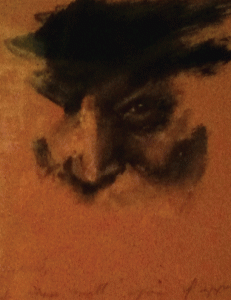6. The Inconceivable Liberation
Thereupon, the venerable Sariputra had this thought: “There is not even a single chair in this house. Where are these disciples and bodhisattvas going to sit?” The Licchavi Vimalakirti read the thought of the venerable Sariputra and said, “Reverend Sariputra, did you come here for the sake of the Dharma? Or did you come here for the sake of a chair?” Sariputra replied, “I came for the sake of the Dharma, not for the sake of a chair.” Vimalakirti continued, “Reverend Sariputra, he who is interested in the Dharma is not interested even in his own body, much less in a chair. Reverend Sariputra, he who is interested in the Dharma has no interest in matter, sensation, intellect, motivation, or consciousness. He has no interest in these aggregates, or in the elements, or in the sensemedia. Interested in the Dharma, he has no interest in the realm of desire, the realm of matter, or the immaterial realm. Interested in the Dharma, he is not interested in attachment to the Buddha, attachment to the Dharma, or attachment to the Sangha. Reverend Sariputra, he who is interested in the Dharma is not interested in recognizing suffering, abandoning its origination, realizing its cessation, or practicing the path. Why? The Dharma is ultimately without formulation and without verbalization. Who verbalizes: ‘Suffering should be recognized, origination should be eliminated, cessation should be realized, the path should be practiced,’ is not interested in the Dharma but is interested in verbalization. “Reverend Sariputra, the Dharma is calm and peaceful. Those who are engaged in production and destruction are not interested in the Dharma, are not interested in solitude, but are interested in production and destruction. “Furthermore, reverend Sariputra, the Dharma is without taint and free of defilement. He who is attached to anything, even to liberation, is not interested in the Dharma but is interested in the taint of desire. The Dharma is not an object. He who pursues objects is not interested in the Dharma but is interested in objects. The Dharma is without acceptance or rejection. He who holds on to things or lets go of things is not interested in the Dharma but is interested in holding and letting go. The Dharma is not a secure refuge. He who enjoys a secure refuge is not interested in the Dharma but is interested in a secure refuge. The Dharma is without sign. He whose consciousness pursues signs is not interested in the Dharma but is interested in signs. The Dharma is not a society. He who seeks to associate with the Dharma is not interested in the Dharma but is interested in association. The Dharma is not a sight, a sound, a category, or an idea. He who is involved in sights, sounds, categories, and ideas is not interested in the Dharma but is interested in sights, sounds, categories, and ideas. Reverend Sariputra, the Dharma is free of compounded things and uncompounded things. He who adheres to compounded things and uncompounded things is not interested in the Dharma but is interested in adhering to compounded things and uncompounded things. “Thereupon, reverend Sariputra, if you are interested in the Dharma, you should take no interest in anything.” When Vimalakirti had spoken this discourse, five hundred gods obtained the purity of the Dharma-eye in viewing all things.
Śāriputra’s (once the chief disciple of Shakyamuni Buddha ) appearance within the Vimalakriti Sutra is representative of the Hinayanan understanding of the Dharma—which runs head-on here with the Mahayanan notion of the Buddhadharma. The former path is rooted in the Four Noble Truths that is bracketed with the traditional understanding based on the recognition and the overcoming of suffering AS a transcendent path to liberation which culminates with Nirvana. There is no deviation here. It is rooted in Buddhaic Law. And yet the law in and of itself becomes so self-sufficient that it completely misses the bodhi-force that encompasses and supersedes the Law—as Jesus the Christ once said, it is the Spirit behind the external law that matters. Being so self-sufficient one misses the real nature of Dharmadhatu breaking forth all around them. A Traditionalist, being always self-sufficient in their rigid traditionalism, (via rules, rituals and observances–thus religious associations) in many diverse paths becomes more concerned with the external environment—as represented here with Śāriputra’s overt concern with the unavailability of chairs for the assembly. Vimalakriti reprimands him and he becomes struck by the fact that this whole affair is not a matter of sitting. Externals matter not and in fact are a direct hindrance to the Buddhadharma that is concerned more with direct knowing—the Buddha-gnosis, i.e., the gnosis of the Buddhas breaking through the mad game of “hide and Go-Seek” (that the One Mind plays with itself) as the True Face of the Buddhadharma hiding behind rules and regulations. One cannot seek and find the Buddhadharma through the obtrusive lens of the skandhas—in fact, the skandhas become the rulers of the game within Traditionalism. In this objective sense, even the three jewels, (Buddha, Dharma, Sangha) are held suspect. If one attempts to find “comfort” in any of these external formulations then one is in for a rude awakening. Ya-ain’t gonna find comfort here or there! If you’re looking for comfort and satisfaction in this vein, the Buddhadharma ain’t for you. One can never hear, taste, smell, touch or even psychically -sense the Buddhadharma. It is a sense-less affair. Don’t even look for “a sign” of it to appear anywhere. If one embraces the skandhic-traditionalist route, then one is always framed by conditions—the Mind seeking Itself in all the wrong places. Whereas, the Unborn Light of the Buddhadharma is condition-less; thus, authentic seeing and hearing is through the Dragon-Eye of Tathata (the mystical inner-eye of perception that awakens the hidden Dharma-child within the womb of suchness…seeing AS Dharma Itself sees).


Difficult, difficult.
Maybe that’s why its called “Inconceivable”.
Yes, too difficult.